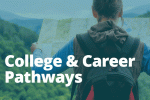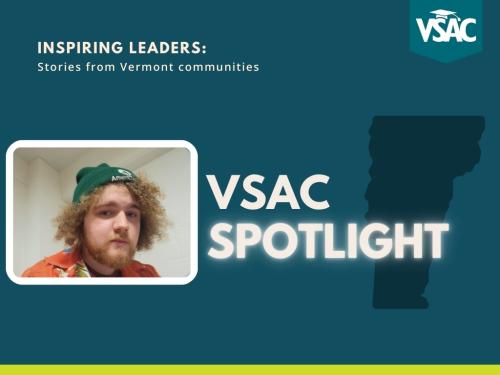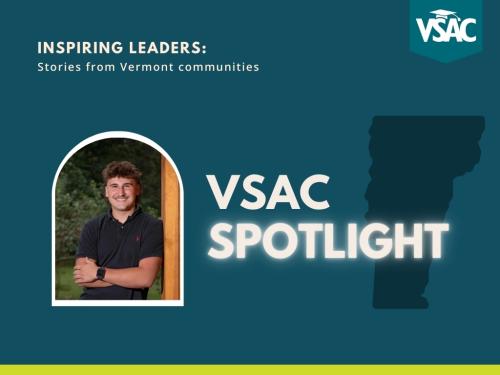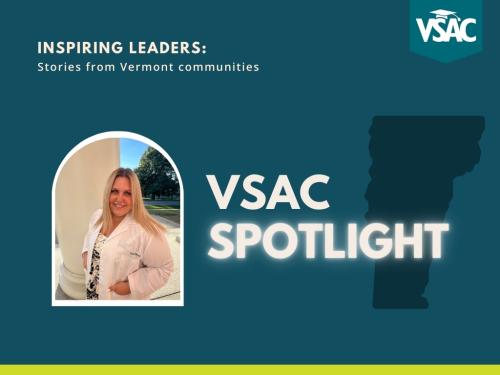VSAC will be closed Monday, February 16, 2026 in observance of Presidents’ Day.
Nicole Dunn’s Challenges Eased with VSAC’s Help to Return to College
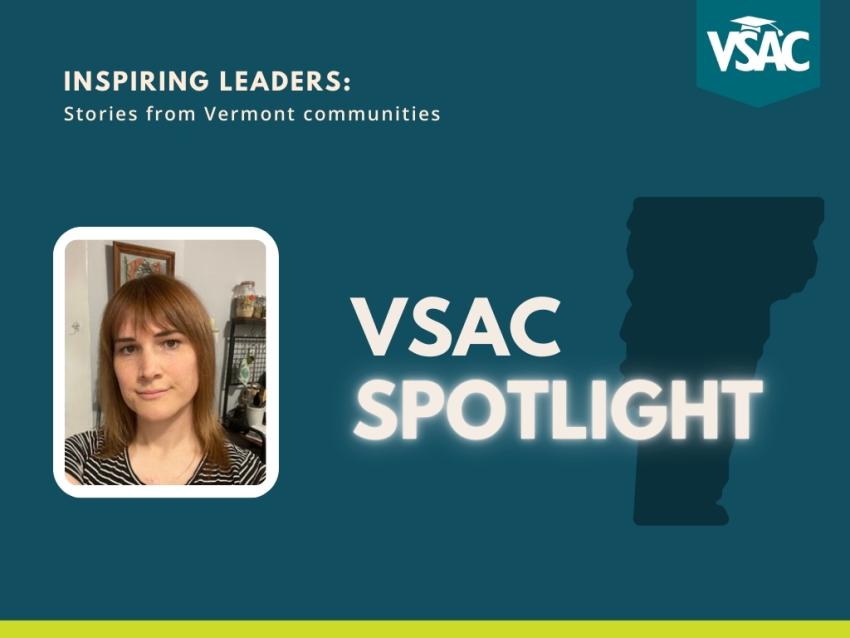
Nicole Dunn has had a tough go of it in her 37 years. She has struggled to come to terms with her transgender identity, has overcome depression, and is in recovery from alcoholism. And while her outlet has always been music — she has toured with several successful bands — the pandemic put a hold on her performance career.
But when faced with adversity, Nicole has always sought help and pushed through. Now, with the help of VSAC, she is midway through earning her bachelor’s degree in psychology from the Community College of Vermont. She plans to become a private-practice therapist to help others through many of the same adversities she has experienced.
Nicole grew up in the California Bay area, the oldest of three children. Her mom worked as a florist, and her dad ran a highly successful courier business up until the late 1990s when the rise of the Internet put the company out of business. At that point, her dad worked various jobs, moving from state to state, and his absence — along with the family’s highly-reduced financial circumstances — made for stressful adolescence for Nicole and her sisters.
Nicole was a straight-A student throughout her high school years at Ygnacio Valley High School; but when she went on to community college right after graduation, she left after one semester. “I wanted to discover myself and who I was as a person,” she recalls. Her parents had both attended community college as well, but neither graduated, and she remembers that college was only vaguely encouraged in her family. She felt she needed to spread her wings.
So she moved to San Francisco, got a job at a skate shop, and got involved in the punk-rock music scene. While she says that going back to school was always in the back of her mind, it never became a priority. “I was aspiring to be a career musician, and you don’t really need formal education for that. You just work your way up,” says Nicole, who grew up going to rock shows in Berkeley, where a lot of popular punk bands got their start.
A relationship took her to the East Coast for a while, but she eventually returned to San Francisco, where she felt she could find more services and support for something she was increasingly contemplating: that she would be more comfortable living as a woman.
For Nicole, who was born a boy and lived as a male up until her mid-20s, the enormity of embracing her female identity and the stress of deciding whether she really wanted to transition led her into a dark depression. “I was playing in punk bands and drinking a lot,” she recalls. When she finally came out to her parents in 2013, they weren’t supportive at first. “They needed to educate themselves,” she says, noting that, at the time, trans awareness was in its infancy. “Our culture has come a long way in the last 10 years. People put their pronouns in their emails now, and we have trans education in schools and workplaces. When I was coming out, no one was talking about this. I was the first trans person many people met. And that was in San Francisco!” Nicole recalls.
When she moved to Vermont, she found a combination of ignorance and acceptance that she says made sense for a small state with a couple of progressive cities. “With such a small population, there aren’t a lot of transgender people, but I found a good vibe in Burlington and Montpelier.”
She was living in Montpelier, working at the Savoy Theater, and touring as the drummer for a popular heavy metal band called “All Your Sisters,” when the pandemic hit. “We were playing at big venues all the time, and it was really cool,” she recalls; but at the beginning of 2020, it all got canceled.
“I was traveling for shows and working in the service industry, and both of those things suddenly disappeared,” she says, which led her to revisit the possibility of getting her degree.
With her schedule mostly empty and her basic needs covered by unemployment, “I figured, this was the time to do it.”
So she enrolled at CCV, where the advising team connected her with VSAC. “VSAC helped me out with a lot of grants and just generally guided me in the right direction,” she says. Nicole worked with Ran Wang, a counselor who works with adult students through VSAC’s Employment Opportunity Center. “Ran’s been really cool. She helped me access everything, get into the right classes, and set me on the right path. I’m super thankful. I’ve talked to a lot of people in different states, and their community college experiences have not been as good. Here, the advisers at VSAC and CCV were able to help me out, one-on-one.”
Ran, who has worked with Nicole since June 2021, admires her perseverance and resolve. “Being first-gen, a recovering alcoholic, and a transgender, Nicole has overcome lots of barriers, mentally, physically, and financially, to get to this point. She is determined to be successful.”
Nicole’s favorite classes so far have been science, spirituality, statistics, and writing. “I like learning how people think,” she says. “I find it really interesting.”
She’s also rediscovered the fact that she’s a good student — as long as she sets her mind to it. “I give up easily because I get frustrated; but when I take the time to focus on the subject, I’m pretty good at it,” says Nicole, who made the Dean’s List last semester.
“The pandemic for me was great for self-growth,” she says. “It was an opportunity for me to re-prioritize my life and figure out my purpose. I realized I really liked school. I enjoyed the regimen, the dynamic, just thinking about things beyond my narrow scope. I started diving into subjects I’ve always wanted to learn.”
While Nicole still plays music, her work is now studio-based. Her current band for which she plays drums, bass, and lead vocals, has a new album coming out in May.
In the meantime, she’s studying hard.
“The best advice I can give is that it’s never too late to go back to school. You’d be surprised; once you get into it, it’s not as hard as you think,” she says. “It’s easy to get discouraged because everyone around you seems to be settled in their careers — but they’re not necessarily happy or fulfilled. I know my experience has helped me land where I am now. Without that, I wouldn’t be on the right path.”
For information on college and career planning and help with financial aid, go to www.vsac.org/FAFSAfirst and check out our online workshops and events. You can also give us a call at 800-642-3177, 8 a.m. to 4:30 p.m., Monday through Friday, and online at info@vsac.org.

